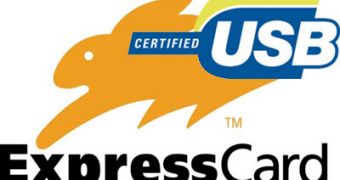PCMCIA, a technology trade association, announced that it is developing the new ExpressCard standard 2.0 to be compatible with significantly faster speeds. The actual release of the next-generation ExpressCard is expected to become public sometime during Q3 - Q4 2008 or in early 2009.
"Notebook and module developers will be able to take advantage of the ExpressCard 2.0 standard to create new, innovative consumer products that embrace its significantly increased performance," said Brad Saunders, chairman of PCMCIA.
The transfer rate supported by the new ExpressCard should range between two and ten times faster than the previous version, ExpressCard Standard 1.2. The speed increases will allow the new standard to achieve transfer rates starting from 5Gb/s and up to 25Gb/s. In other words (or numbers), that would be a range from 625MB/s to 3.125MB/s. The upcoming ExpressCard standard 2.0 will allow manufacturers to design and build new high performance consumers products, such as external HDDs or SSDs, as well as external graphics adapters or any other multimedia products for mobile computers that will require high bandwidth.
The advanced serial I/O technologies, PCI Express and USB are the base for the ExpressCard standard. One of the features of the new ExpressCard standard is that it provides support for the new SuperSpeed USB, expected to burst on the loose later this year, as a part of the USB 3.0 specification. The next-generation SuperSpeed USB standard will be able to offer speeds ten times faster than those featured by the Hi-Speed USB.
The ExpressCard 2.0 standard will provide compatibility with all products compliant with the previous versions. After the release of the ExpressCard 2.0 Standard, a new compliance program is expected to be phased. ExpressCard now features plug'n'play applications like memory; local area network (LAN); wireless broadband (WWAN); WiFi; TV tuners; smart card readers; 1394, memory, parallel, serial, Serial ATA (SATA) and USB adapters.

 14 DAY TRIAL //
14 DAY TRIAL //